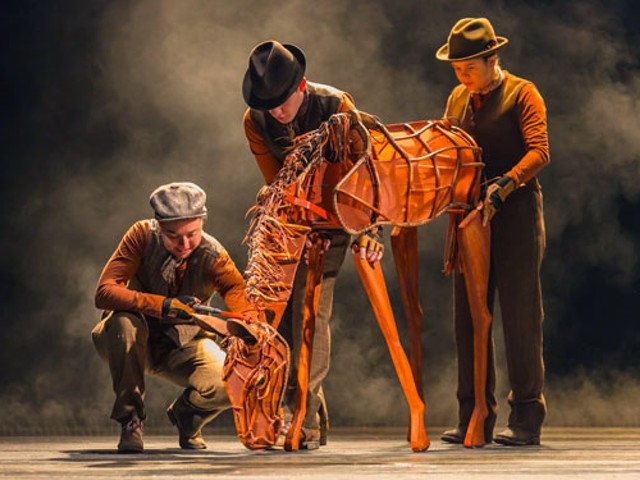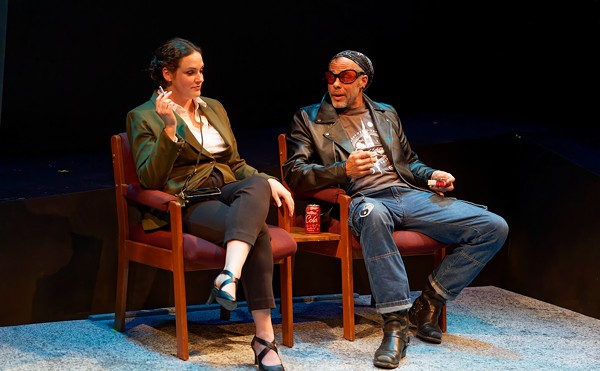Early in the first act of St. Louis Shakespeare's production of As You Like It, a wrestling match breaks out. Orlando (Aaron Dodd), a hotheaded young nobleman being kept down on the farm by his older brother, challenges the hulking champion, Charles (Carl Overly Jr.), in order to prove his worth to his brother and himself. Director Brian A. Peters arrays his cast across the stage to watch the match.
There's the haughty usurper, Duke Frederick (Robert Ashton), observing with regal disdain, his men lurking behind him sycophantically. His beautiful daughter Celia (Maggie Murphy) and his similarly toothsome niece Rosalind (Betsy Bowman) hide behind their hands, unable to watch the handsome Orlando splattered into the dirt (Rosalind in particular, as she's smitten with Orlando). Lords and soldiers jostle for position and shout for blood. Far to the side is Oliver (Anthony Wininger), Orlando's older brother. He peers from behind the fence, his face wrinkled by a conspiratorial sneer; he has ordered Charles to pulverize Orlando and can't wait to see the carnage unfold. Behind the cast are the ghostly trees of the Arden Forest, simply rendered in wire and sheer fabric by scene designer Cristie Johnston. The combatants eye one another, pause and then set to throwing one another around the stage.
It's a magical moment — that pause. Every character's story is presented visually, and Peters gives you just enough time to take it all in. It's the last deep breath before things fall apart.
Orlando wins his fight, only to be banished by the Duke, who also gives the heave-ho to Rosalind for being the daughter of the man he deposed (Duke Senior, also portrayed by Ashton); Celia determines to flee with her beloved cousin. Orlando and the gals end up in Arden Forest — the former having fallen in with Duke Senior, while the girls have disguised themselves as common people, with Rosalind going so far as to adopt boys' dress and calling herself Ganymede.
All of this takes very long to unfold, but not really very long at all. The middle of the play suffers from very up-and-down pacing, with some scenes dragging and others flitting swiftly by. It's the oddest thing, almost as if that initial marvelous pause keeps popping up at the worst possible moment to stall all momentum.
Dodd does excellent work as the love-besotted Orlando in the country scenes, skipping through the woods throwing sheaves of his horrible love poems to the trees. Bowman, now disguised as Ganymede, is also sterling. Bold and saucy as all get-out, she convinces Orlando that he should practice wooing "him" (and, for authenticity's sake, call him Rosalind). Yeah, it's weird. Dodd's hesitancy to commit to the plan becomes a growing suspicion, revealed via sidelong glances and narrowed eyes, that Ganymede is not whom he purports to be.
Their strange courtship is bolstered by Maggie Murphy's work in the near background. Staring daggers at her cousin, rolling her eyes, loudly clearing her throat and often dragging Ganymede by one arm away from Orlando, she's the picture of reason by stifled by more urgent emotions.
It's a show with much to recommend it. You may not love it — but you'll certainly like it.





